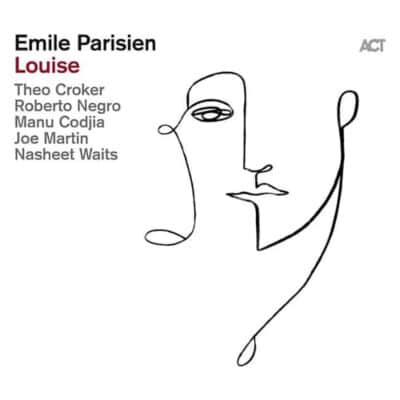Emile Parisien Sextet Louise
Louise
ACT Music & Vision
French soprano saxophonist Emile Parisien forms American-European sextet for Louise, marking a decade with the Munich-based label, ACT Music & Vision. New listeners to Parisien will quickly sense a distinctive soprano saxophone tone, one that is softer and that often reads like a string instrument such as a violin or viola. Joining the saxophonist in this elite sextet are renowned trumpeter Theo Croker, frequent collaborators, Paris-based keyboardist Roberto Negro and French guitarist Manu Codjia, Americans bassist Joe Martin and in-demand drummer Nasheet Waits. The album is Parisien’s seventh release as a leader or co-leader on the label.
The album begins softly with Parisien’s unaccompanied, rather somber intro melting into intertwining lines with Croker in the title track as Waits and Martin subtly support with Negro and Codjia comping before the latter delivers a brimming solo and engages in dialogue with Martin as the tune builds in scope. We learn through the liners that the tune takes its name from the sculpture of a spider from Louise Bourgeois, and serves as metaphor for weaving, referencing the theme of the intertwining line of the front line. The sextet then delivers a vibrant, highly improvised version of Joe Zawinul and Weather Report’s “Madagascar,” where all members stretch out. Waits becomes unmistakable present here and from this point out, is impossible to ignore throughout the album, especially for his skittering snare work.
Parisien then takes us through the three part, 17 minutes in total, “Memento,” dedicated to his mother. The emotive melody is European is character, featuring gorgeous unison harmonics of the soprano and bowed bass, and later the soprano and trumpet as Codjia and Negro add colors and texture. From its calm beginning, Part I grows in intensity with Codjia’s inspired solo, propelled by the ever-vigorous Waits. Parisien seems re-energized as he soars above the fray. The first half of Part II features an improvisatory Negro in solo mode before a percolating groove underlies spirited sextet playing in the second half. Part 111 carries a festive melody, inspired turns from Negro. Codjia, and Parisien to an initial feisty march-like tempo that Waits eventually morphs into a glorious maelstrom on his kit. These musicians display remarkable command of the shifting tempos and rhythms.
Parisien devotes the latter half of the album mostly to compositions from the group members. Negro’s elegant “Il giorno della civetta’ is rife with bright spots from the leader, and especially blooming Croker, Codjia, and the composer. Parisien injects his own sprightly, undulating “Jojo,” before ceding the balance first to Codjia’s “Jungle Jig” and Croker’s “Prayer 4 Peace” as the finale. On his own piece, Parisien coaxes such a full, robust sound from his soprano that one could easily mistake it for an alto. Codjia’s piece also features complex, rapid-run rhythms that at times threaten to careen out of control, but these musicians consistently deftly harness changes and move from the frenetic to the serene almost instantly. The abrupt ending is yet another unexpected touch. The contrasting serenity and solemnity come immediately in Croker’s redolent piece, the epitome of restraint from these same players who were boisterous in their previous approach.
This is one of those albums that will amaze and thrill. There’s wonderful jazz taking place in Europe that we on stateside don’t often hear. Parisien is taking a direct step by mixing his group with familiar American names, thereby perhaps drawing more to his music. His gorgeous, unique soprano sound and riveting compositions deserve attention from all continents. Spread the word.
- Jim Hynes
Buy Us a Cup of Coffee!
Join the movement in supporting Making a Scene, the premier independent resource for both emerging musicians and the dedicated fans who champion them.
We showcase this vibrant community that celebrates the raw talent and creative spirit driving the music industry forward. From insightful articles and in-depth interviews to exclusive content and insider tips, Making a Scene empowers artists to thrive and fans to discover their next favorite sound.
Together, let’s amplify the voices of independent musicians and forge unforgettable connections through the power of music
Make a one-time donation
Make a monthly donation
Make a yearly donation
Buy us a cup of Coffee!
Or enter a custom amount
Your contribution is appreciated.
Your contribution is appreciated.
Your contribution is appreciated.
DonateDonate monthlyDonate yearlyYou can donate directly through Paypal!
Subscribe to Our Newsletter
Order the New Book From Making a Scene
Breaking Chains – Navigating the Decentralized Music Industry
Breaking Chains is a groundbreaking guide for independent musicians ready to take control of their careers in the rapidly evolving world of decentralized music. From blockchain-powered royalties to NFTs, DAOs, and smart contracts, this book breaks down complex Web3 concepts into practical strategies that help artists earn more, connect directly with fans, and retain creative freedom. With real-world examples, platform recommendations, and step-by-step guidance, it empowers musicians to bypass traditional gatekeepers and build sustainable careers on their own terms.
More than just a tech manual, Breaking Chains explores the bigger picture—how decentralization can rebuild the music industry’s middle class, strengthen local economies, and transform fans into stakeholders in an artist’s journey. Whether you’re an emerging musician, a veteran indie artist, or a curious fan of the next music revolution, this book is your roadmap to the future of fair, transparent, and community-driven music.
Get your Limited Edition Signed and Numbered (Only 50 copies Available) Free Shipping Included
Discover more from Making A Scene!
Subscribe to get the latest posts sent to your email.









